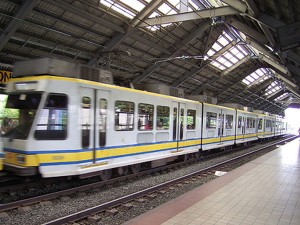MANILA, Philippines–A militant group over the weekend criticized as “highly anomalous” the P65-billion Light Rail Transit Line 1 (LRT-1) public-private partnership (PPP) deal, describing the agreement as one “motivated by profit, not public service.”
In a statement, the Bagong Alyansang Makabayan (Bayan) specifically cited financial guarantees for the private concessionaire on the rates for the LRT-1 PPP, which involves the extension and operation of the aging railway line in Metro Manila to Bacoor, Cavite, for a period of 32 years.
A tandem led by Metro Pacific Investments Corp. and Ayala Corp., which offered a premium payment of P9.35 billion, was the sole bidder for the PPP deal, now on its second bidding round after a failed auction last August. A premium payment is an amount that comes on top of the construction cost for the 11.7-km extension of the project.
The government expects to award the project in the coming days or weeks.
“This deal is highly anomalous. The agreement practically provides the private concessionaires so many guarantees, their investment will be risk-free. All the risks will be shouldered by the government and the commuters,” Bayan secretary general Renato M. Reyes Jr. said.
Bayan said it was reviewing a copy of the concession agreement between the government and the private consortium.
Based on the agreement, the private operator is assured of a 5- percent fare increase once the 7-km extension project is completed, and an adjustment in fares every two years amounting to 10.25 percent.
The agreement establishes the concept of a “notional fare,” which is adjusted periodically by the private concessionaire. This would be the ideal fare for the LRT-1 operations to be profitable.
The government, through its agencies, would then have to come up with “approved fares,” which should correspond to the “notional fare.”
But the Department of Transportation and Communications (DOTC), which is implementing the project, denied the accusations, saying the concession was a fair agreement between the government and the private sector.
“In fact, it is advantageous to the government, having yielded a premium payment, and especially for the riders and residents of Parañaque, Las Piñas, and Cavite,” Michael Sagcal, DOTC spokesman, said in a text message on Sunday.
“They will soon have affordable and convenient access to opportunities in Metro Manila. This is the way to progress, and it shouldn’t be impeded by those who wish to withhold inclusive growth to those stakeholders,” Sagcal said.
Bayan also revealed the existence of a P500-million standby fund that could only be withdrawn to pay the government’s obligations to the private concessionaires or upon consent of the private concessionaires.
The fund or “blocked account” shall be replenished every year. In the absence of P500 million in cash, the government may provide the private investors with “irrevocable standby letters of credit” issued by a universal or commercial bank.
“What will happen now is that LRT-1 will be run just like any other business, like Meralco, Maynilad or Manila Water, incidentally also owned by Metro Pacific and Ayala. The LRT-1 operations will be motivated by profit, not public service,” Reyes said.
